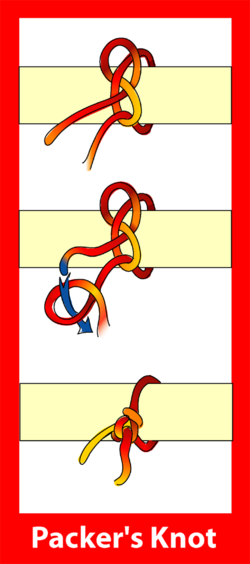m (8 revision(s) from w:Packer's knot) |
m (W126jep moved page Adventist Youth Honors Answer Book/Knot/Packer's to AY Honors/Knot/Packer's without leaving a redirect: Part of translatable page "Adventist Youth Honors Answer Book/Knot/Packer's") |
||
| (12 intermediate revisions by 3 users not shown) | |||
| Line 1: | Line 1: | ||
| − | {{Knot | + | <noinclude><translate><!--T:2--> |
| + | </noinclude> | ||
| + | {{Knot | ||
| name=Packer's knot | | name=Packer's knot | ||
| image= Packers knot.png | | image= Packers knot.png | ||
| − | | | + | | use = The '''Packer's Knot''' is a binding knot usually used in smaller line. |
| − | + | This knot is sometimes used in baling and in parcel tying. | |
| − | + | |tying_instructions = | |
| − | + | # Make a figure eight not near the standing end of the rope. Wrap the running end around the "parcel" and pass it through the top loop of the "eight" following the same path as standing end. | |
| − | + | # Make a loop in the running end and pass the standing end through it. | |
| − | + | # Tighten. | |
| − | |||
| − | | | ||
| − | |||
}} | }} | ||
| − | + | <!--T:3--> | |
| − | + | {{#ifeq:{{#titleparts:{{PAGENAME}}|1}}|Adventist Youth Honors Answer Book|[[Category:Adventist Youth Honors Answer Book|{{SUBPAGENAME}}]]}}<!-- For use on [[knots]] --> | |
| − | + | <noinclude></translate></noinclude> | |
| − | |||
| − | |||
| − | |||
| − | |||
Latest revision as of 14:55, 8 September 2021
| Packer's knot |
|---|
|
Use: The Packer's Knot is a binding knot usually used in smaller line.
This knot is sometimes used in baling and in parcel tying.
How to tie:
|

